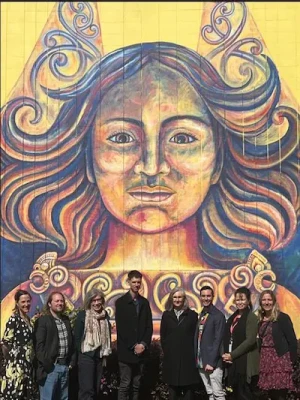The project focuses on integrating Indigenous perspectives into teaching, enhancing learning experiences, and using digital tools to make online education more engaging.

Left to right Kim Hebert-Losier (UoW), Brendan Sheridan (UoW), Karen Mate (UoN), Paul McDonald (UoN), Josephine Smith (UoN), Guy Cameron (UoN), Gloria Clarke (UoW), Joanna Hicks (UoW).
The project was led by Josephine Smith, Senior Lecturer with the School of Biomedical Sciences and Pharmacy at the University of Newcastle, and Joanna Hicks, Senior Lecturer in Biomedical Sciences at the University of Waikato.
“Staff at the University of Waikato learn about Te Ao Māori (the Māori World) through the Centre of Tertiary Teaching and Learning courses and in our Division of Health, we attend a weekly cultural hour to connect, learn and share knowledge with our committee of Māori and Pacific staff who guide us in our teaching and research and help us to create safe, respectful spaces for our students” Joanna explains.
Embracing Te Ao Māori and Cultural Learning
The project highlighted the importance of cultural exchange. Josephine Smith, who visited the University of Waikato, shares how attending Kīngitanga Day had a profound impact.
Kīngitanga Day is a celebration of Māori culture and history and on this day all classes at the University of Waikato cease and students and staff reflect on their connection to the Kīngitanga - a unifying movement that started with the crowning of the first Māori King in 1858 and advocates for Māori rights.
"Visiting the University of Waikato opened my eyes to new ways of thinking about teaching" says Josephine. "We experienced a yarning circle at Waikato where we all shared and learned from one another and this experience of being open and human breaks down the traditional teacher-student divide.”
"It’s important for students to see us as real people, not just experts. The old way, where the lecturer is the 'fount of all knowledge,' doesn't work for many students these days,” Joanna adds.
For both researchers, embracing Indigenous cultural practices in teaching is a key step toward creating a more inclusive environment.
“In cellular and molecular biology at Waikato, we’ve been experimenting with more interactive, hands-on activities and workshops instead of lectures and students appreciate how approachable staff are and feel comfortable to ask questions,” Joanna says.
Creating Meaningful Change
A core takeaway from the project was the need for thoughtful, holistic change.
"Making meaningful changes requires more than checking boxes, it’s about truly engaging with Indigenous communities and making sure all voices are heard" Josephine explains.
"The project with the University of Waikato has advanced initiatives by our School of Biomedical Sciences and Pharmacy’s Indigenous Student Engagement Committee at the University of Newcastle to obtain more seed funding to build relationships with students and stakeholders that inform our future activities.”
“Our goal is to establish a School community consultation panel with our local Aboriginal community to provide ongoing guidance and help us implement a consistent approach to integrating Indigenous perspectives across multiple programs,” says Josephine.
Digital Learning Tools and Innovation
From four courses in 2022 to seventeen in 2024, more courses in our school are adopting these innovative digital learning tools to make online learning more engaging
Josephine
Inspired by this success, the University of Waikato has implemented similar technologies.
“Our team member Kim won a national teaching award for creating a series of videos inspired by our project with the University of Newcastle,” Joanna says.
Looking Ahead
While both universities are proud of their progress, they acknowledge there is still more work to be done.
"It's a work in progress, but we’re committed to getting it right as there is always more we can do for our Māori and Pacific students," says Joanna.
"We’re not the experts in Te Ao Māori, and it’s not our knowledge to teach, but working alongside my colleague Dr Gloria Clarke has helped create a comfortable learning space for students where their culture is respected and valued" says Joanna.
This project highlights the positive impact of integration of Indigenous perspectives in educational programs.
Republished with permission from The University of Newcastle Australia, strategic partner of the University of Waikato. View the original article on the University of Newcastle website. Learn more about the University of Waikato and University of Newcastle partnership seed fund.



